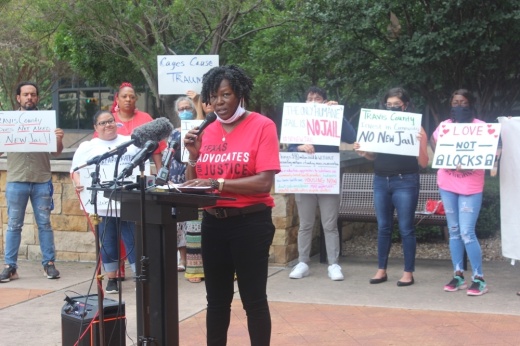The women’s jail is a proposed project of the 2016 Travis County Master Plan, a 20-year blueprint to upgrade Travis County Jail facilities, which also includes a new central booking facility in downtown Austin. Overall, the first phase of the plan carries an estimated $240.5 million price tag.
County staff and sheriff’s office representatives say the project, called the Travis County Trauma Informed Women’s Facility, is needed to give female inmates equitable access to health services and gender-specific programming, as well as safe lodging with adequate separation from male inmates. Currently, women booked into the county jail system are split between four separate facilities that also hold men, with varying access to mental and physical health services, including OB/GYN services.
In 2018, commissioners delayed initiating the design and preconstruction of a new women’s correctional facility in Del Valle near the existing Travis County Adult Correctional Complex to research the option to create more jail diversion programs. However, in December 2019, commissioners authorized county staff to begin contract negotiations with HDR Architecture to build the new women’s jail. A vote approving a $4.3 million contract with HDR Architecture is scheduled for a June 8 meeting of the commissioners court.
“The final campus configuration will provide more flexible, efficient, modern and updated housing and programming. The 20-year plan creates the opportunity to build trauma-informed housing and services to better serve incarcerated individuals and create more efficiency at the complex,” said Christy Moffett, managing director of economic and strategic planning for the county, in a May 27 presentation to Travis County Commissioner Court.
Critics of the project include groups, such as Grassroots Leadership, Texas Criminal Justice Coalition and the Texas Fair Defense Project. At a June 7 news conference, a coalition of these organizations called for a “moratorium on all jail construction and expansion” and called for investment in community resources for poor and indigent people. A letter to commissioners also included a call for the county to replace its 2016 Master Plan with a new Justice Reinvestment Plan that identifies community-based alternatives to incarceration.
“It doesn’t matter what name you give it; [jail] is a dehumanizing place to put people,” said Annette Price, co-executive director of Grassroots Leadership. “By building this jail, you are sending a message that incarceration is better than providing needed resources [for] our community to thrive.”
Travis County Judge Andy Brown has said he also opposes construction of the women’s jail, along with any other new correctional facilities.
“We must revamp the way we look at the criminal justice system and look at how $80 million can better serve the community itself,” Brown said in a June 3 tweet. “One way we can do this is by investing in more mental [health], behavioral health, and detox services outside the jail, addressing the needs in Black and brown communities.”
Brown previously served on the board of directors for one such diversion resource, the Sobering Center, a facility where intoxicated individuals are able to stay until they are sober and receive referrals to additional resources. It has admitted around 3,900 people since it was established in 2018.
However, Jeff Travillion, commissioner for Travis County Precinct 1, said diverting the $80 million planned for the jail is not a simple proposition. The project would not be funded by the county’s general budget but by certificates of obligation, a debt issuance specifically for brick-and-mortar projects.
“I think the difficulty is that if you take away the treatment that is provided for poor populations from the jail system, then there are no alternatives, or very few alternatives, outside the context of jail,” Travillion told Community Impact Newspaper. “That is troubling, but if you give me the choice between some services and no services, I will pick some services each time.”
Critics have also pointed out that the number of incarcerated individuals in Travis County correctional facilities has sharply decreased since the master plan was conceived in 2016. Travis County correctional facilities now hold around 1,400 inmates, versus 2,651 in 2016, with coronavirus-related diversion policies partially responsible for that decrease. Around 153 of those inmates are women.
However, Travis County Sheriff’s Office representatives said in a May 27 presentation that many of the county’s remaining incarcerated people have mental or physical health needs that are not adequately addressed by the county’s existing carceral infrastructure. According to Travillion, building more clinical space to address these needs is a top priority for him and other commissioners.
“The reason that we delayed it in the first place ... was that we did not have adequate clinical space [planned]. My goal was not only to remove women from facilities that include men; it was also to put them in a state-of-the-art clinical facility because we have learned so much more about health care in the last 25 or 30 years,” he said.





